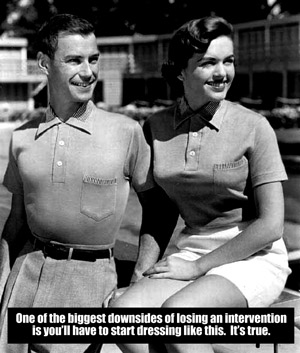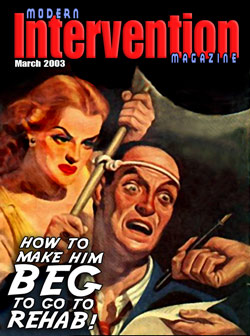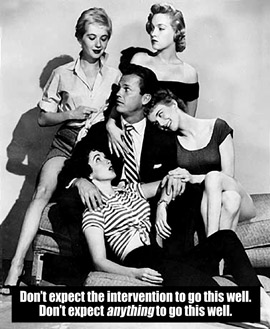It may have already happened to you.
A friend or family member invites you over for a drink and suddenly you find yourself surrounded by the uptightest of your loved ones, trapped in an emotional ambush, pinned down with accusations that you, yes you, dear drunkard, are a monstrously diseased person. A person with a problem so horrifically out of control they are forced, yes forced, to confront you and make you change.
Now, there are those who secretly welcome interventions, either out of a selfish craving for attention or a repressed desire to stop drinking. If you are reading this magazine, however, you are most likely neither, and this article is for you.
First off, a properly executed intervention places you at a huge disadvantage. You are caught off guard, heavily outnumbered and most likely badly hungover. That doesn’t mean, however, that you can’t escape with your dignity and desire to drink intact. As a matter of fact, with proper preparation and foresight, you can not only duck the bullets, but turn back the attack and send the opposition running for cover. Here’s what to expect and, more importantly, how to win.
 Remain Calm
Remain Calm
Not such an easy thing to do. An intervention is a sneak attack, a very personal Pearl Harbor. You think your life is careening happily along like a brilliantly out-of-control speed boat and suddenly Japanese zeros (piloted by your friends, no less) are shrieking out of the sky to drop thousand-pound guilt bombs on your happy little ship.
 Surprised people tend to react emotionally and attacked people tend to react defensively, and you must fight down both urges. You will lose a shouting match because there are more of them and they’ve already worked out their attack. Muster all your inner strength and screw an indulgent and reasonable smile onto your face. Let them get emotional. When you respond to their outrageous demands, speak in the quiet and sonorous voice of reason. Adopt the attitude of a tolerant child psychologist dealing with irrational and angry children, imitate the calm unemotional timbre of the semi-infallible HAL 9000 computer in 2001: A Space Odyssey. Try to end all your sentences with your opponent’s first names. Answer questions with questions. Make them explain their motivations. For example:
Surprised people tend to react emotionally and attacked people tend to react defensively, and you must fight down both urges. You will lose a shouting match because there are more of them and they’ve already worked out their attack. Muster all your inner strength and screw an indulgent and reasonable smile onto your face. Let them get emotional. When you respond to their outrageous demands, speak in the quiet and sonorous voice of reason. Adopt the attitude of a tolerant child psychologist dealing with irrational and angry children, imitate the calm unemotional timbre of the semi-infallible HAL 9000 computer in 2001: A Space Odyssey. Try to end all your sentences with your opponent’s first names. Answer questions with questions. Make them explain their motivations. For example:
“Frank, why do you drink so much?”
“Do you really think I drink too much, Sam?
“Hell yes, I do! Hell yes!”
“Why do you think that, Sam?
“Because you drink more than everyone else!”
“Jackie Gleason told more jokes than most people. I don’t think that makes him a bad person. Do you think he was a bad person, Sam?”
“We’re not talking about jokes. Were talking about drinking.”
“I don’t know if you know this, Sam, but Gleason also drank way more than most people. Did you know that, Sam?”
“Yes, and that makes him a very sad person.”
“He was a very happy person, Sam. I think most people would love to live his life. He lived to be 72. Did you know that, Sam?”
“We’re not talking about Jackie Gleason! We’re talking about you!”
“Are you saying I don’t deserve to be as happy as Jackie Gleason? Why do you feel that way, Sam? Perhaps we should get to the bottom of those feelings before we go any further. Sam.”
It will drive them crazy.
 Revel in the Truth
Revel in the Truth
If they are following the standard intervention template, right off the bat they will insist you admit you are an alcoholic. This is not the time to get defensive and start telling fancy lies. Once you start denying what you and they both know to be true, you’ve already lost the moral high ground. They are laying siege to the fortress that is your lifestyle and lies make for lousy sandbags.
Admit that you are, in fact, an alcoholic. Wholeheartedly. Embrace the title and steal its power. Admit to it in the same matter-of-fact, yet modest tone you would confess to being the undisputed world pickle-eating champion. No big deal, it’s just something you’re rather good at. Do not present yourself as a craven and shameful victim, instead stand tall as a reasonably proud and entirely self-aware recreational drinker. This tactic will most likely throw them off and may even enrage them. They will have expected you to duck this punch and instead you let the blow bounce of your granite chin like an errant moth.
 Get God and Science On Your Side
Get God and Science On Your Side
Next they are likely to say: “Don’t you realize the harm the booze is doing to you?” This ploy was quite effective when everyone thought alcohol was an evil, unhealthy thing, but has lost a great deal of its power in the face of the tidal wave of medical reports attesting to how alcohol is actually very good for you. Most anti-alcohol  organizations still define alcoholism as having two drinks a day which, ironically, is the minimum number even the FDA confesses will cut your risk of heart disease by 30% and extend your life by 3 to 10 years. After you mention these facts, say this: “Truly, what is your interest in sending me to an early grave? You’re not in my will, if that’s what you’re thinking. I will, however, regularly bring flowers to your graves. I may even have a little nip out of my medicinal flask, in your memory, and think: ‘Why oh why wasn’t I strong enough to convince them to save their own lives?’”
organizations still define alcoholism as having two drinks a day which, ironically, is the minimum number even the FDA confesses will cut your risk of heart disease by 30% and extend your life by 3 to 10 years. After you mention these facts, say this: “Truly, what is your interest in sending me to an early grave? You’re not in my will, if that’s what you’re thinking. I will, however, regularly bring flowers to your graves. I may even have a little nip out of my medicinal flask, in your memory, and think: ‘Why oh why wasn’t I strong enough to convince them to save their own lives?’”
If they try swinging the Bible onto their side, remind them that Jesus turned water into wine, not the other way around. The Bible attests that Noah himself liked to get hammered, and where would we all be if that good drunk captain didn’t gather the beasts and float the big boat? And be sure to memorize this biblical zinger: “Give strong drink unto him that is ready to perish, and wine unto those that be of heavy hearts. Let him drink, and forget his poverty, and remember his misery no more (Proverbs 31:06-07).
After letting that one fly, you may ask your hosts if there is any wine to be had.
 Crush the Quisling
Crush the Quisling
At least one member of the group won’t want to be there. He’ll be the one lurking in the background, refusing to make eye contact. He may be a drinker himself. Probably not the same quality of drinker you are, but a fellow imbiber nevertheless. This traitor is very vulnerable to the Fruitarian Gambit. Developed as a forward defense against aggressive vegetarians, it goes like this: When a vegetarian starts ranting about how meat is murder, identify yourself as a Fruitarian (super-vegans who only eat what a plant gives up willingly, such as an apple falling off a tree) and shrill, “Do you know the anguish of the wheat stalk at harvest time? Did you know they can sense when their brethren are being slaughtered around them? Is that a polyblend shirt, cotton killer? Where’s my red dye?”
For every extreme, self-righteous viewpoint, there is an even more extremely self-righteous one, and a modified Fruitarian Gambit can be brought into play as a means to dividing your attackers. Whenever you feel the tide turning against you, suddenly turn to the Quisling and say:
“I’ve seen you put a few down, Bob. Do you know there are those that would condemn you for that?”
“Yes, but I drink moderately, I—
“Yes, but what is moderation? Who makes those rules? Some people, like Sally here, thinks one drink is too many. Remember how drunk you got on your birthday?”
“Yes, but I was celebrating.”
“So maybe I like to celebrate every day! Does that make me a bad person? I expect this of them, but you, Bob? It just makes me sad.”
Then, every time they attack alcohol, turn to Bob and say, “Do you hear what they’re saying about you? You don’t seem such a horrible person to me, Bob. I happen to think you’re a wonderful person.”
He will be shamed. He didn’t want to be there in the first place and now he’ll wish he was somewhere, anywhere else. His hangdog expression will put a drag on the group’s self-righteousness, and he may even start rising to your defense. It’s a cruel trick, but you can make it up by buying him a shot later.
 Shine a Favorable Light on Your Questionable Behavior
Shine a Favorable Light on Your Questionable Behavior
At some point they are likely to roll out a verbal highlight reel of some of your, shall we say, less than gentlemanly antics while under the influence. Whatever you do, resist the urge to insist: “You can’t blame me for that! I was blacked out at the time!” Instead, mold the hideous clay of your bad behavior into cute little bunny rabbits:
“Frank, I watched you drink a whole bottle of cheap vodka!”
“It was all I could afford. Surely you don’t want me blowing my paycheck on some imported brand.”
“You vomited on the bar!”
“I was feeling ill. What do you do when you feel ill?”
“You started a fight with the bouncer when he tried to throw you out!”
“He was insulting your manhood. You might not think your manhood is worth defending, but I do.”
“Then why’d you try to choke me?”
“I was just rough-housing a little. That was my inner-child expressing himself. Are we so locked in the uptight prison of adulthood we can’t goof around a little?”
“Then you went home with a strange woman!”
“Her name is Miss Sally Winterbottom, of the Boston Winterbottoms. And that’s exactly how my grandparents met. They’ve been happily married for fifty years now. Did you know Sally writes the most brilliant poetry, Sam?”
“You missed work the next day!”
“Haven’t you told me time and time again I should quit that awful job? That it’s far below my talents? With any luck they’ll fire me and I’ll be goaded into seeking out my true destiny.”
 Give Them Nifty Nicknames
Give Them Nifty Nicknames
In prison, I’m told, every guard gets a nickname, courtesy of the inmates. You should do your friends the same favor. By now they’re probably getting a little uncomfortable about the whole gig, particularly if it’s their first intervention, and you can heighten the tension by hanging a contrary tag on each of your oppressors. If there is a liberal in the group, start referring to him as Hitler. If another is a conservative, call him Stalin. If there’s a Bible thumper on board, tag her the Grand Inquisitor. Osama works on nearly everyone.
Sprinkle these new nicknames liberally throughout the conversation, for example: “Hey, Hitler, if the Grand Inquisitor over there is making some coffee, can you tell her to whip me up a cocktail? Oh, I forgot, drinking is against the rules now. Ain’t that right, Osama?”
 Make Them Respect Your Individual Pursuit of Happiness
Make Them Respect Your Individual Pursuit of Happiness
The interventionists’ strongest, most difficult-to-repel attack is expressed in a single question: “Do you realize how your drinking is affecting those around you?” Now, if your drinking actually is stealing food from the mouths of your many weeping children, or lends you the uncontrollable urge to wrap your car around the nearest available tree, you’re in trouble. You have no defense at all and should, weeping softly, march with them arm-in-arm to the substance-abuse clinic of their choice.
However, if they are talking about how you are adversely affecting the lives of fully-grown, independent adults that you do not keep locked in your basement, and you know better than driving drunk, you can tell them all to go to hell. If they don’t like the way you live your life, they can clear out at the first sight of you hoisting a highball. Our founding fathers swore the Creator himself gifted us with the inalienable right of the pursuit of happiness, and if your idea of happiness is getting wildly hammered, flopping like a happy seal on any number of poorly-constructed tables and waking up hugging a toilet like it was your long lost millionaire brother, that’s none of their damn business.
If they ask why you drink, and they will, tell them this: “Drinking makes me happy. Are you really the sort of people to steal away the most precious commodity of all: Happiness? You envy my joy! It burns you up that I march through life with laughter in my heart! Your cruel frown envies my giddy grin!”
Let ‘em try those jackboots on and see how they fit.
 Spin a Web of Artistic Pretension
Spin a Web of Artistic Pretension
If you, like every other drunk, fancy yourself a painter/writer/sculptor/amateur beer-commercial deconstructionist or any other stripe of artist, you have a powerful defense at your disposal. Let slip your calm mask for a moment, crank some fiery passion into your voice and lay this concept on them: “Alcohol inspires me to create. What if Picasso’s so-called pals had convinced him to stop drinking absinthe? Sure, he may have become less of an asshole and could have afforded a better apartment, but wouldn’t we be deprived of the brilliantly shining light of his irreplaceable art? Art that has inspired and touched the souls of millions! You would throw all that away so the poor bastard could wake up every morning without a hangover? Really? You are the enemies of art! I decry you as the oppressive jail keepers of creative thought!”
And if they dare smirk at the idea of you being the next Picasso, snarl: “With friends like you, I won’t be!”
 Counter Attack
Counter Attack
Now that you’ve blunted their savage assault, it’s high time to launch your own vengeful attack. The only people bold enough to conduct an intervention are those who consider themselves very close to you, so you most likely will know more than a little about their habits. And everyone, even Mother Theresa, has bad habits. Attack these flaws with a strident, yet deeply concerned tone.
If one of them is overweight, point out that being obese is very bad for the heart and his gluttony is putting his life in great jeopardy. If one of them smokes, point out the dangers of second-hand smoke, and remark that at least when you’re drinking you don’t go around spitting bourbon into people’s mouths. If one of them doesn’t drink at all, point out that not drinking is as dangerous to the heart as being morbidly obese, and they will die years before even the heavy drinker. If one of them drives an SUV, inform her she is selfishly destroying the environment and the future of her children. If one smokes pot or uses other drugs, ask him why he would take away your perfectly legal system of killing stress and adding pleasure to life. Say, “You look agitated, Ralph, sure you don’t want to go smoke one of your doobies? Isn’t it time to pop a Valium, Joan? Score any cocaine lately, Sammy Boy?” Get on your feet and ask if you have the right to force them to change their personal habits.
As a weak defense they will probably say they wished you did care enough to lead them from their sins and you must immediately respond: “Well, that’s more like it! Let’s get down to it! Who shall we start with first? The self-hating glutton, the cancer killer, the drug-addict or the eco-assassin? Hmm?”
On the defensive now, they will mostly likely lamely mutter that the intervention was about helping you, not them, at which point you should turn the screw one last time with: “Why chew on the tail when we can eat the whole hog! Why can’t we all improve ourselves? Let’s fix all our problems right now! We can do it!”
And that will be the end of it. The last thing this type of person wants to do is look into the unforgiving mirror of their own shortcomings. The intervention will deflate into a dejected co-support group. At which point you should invite them all out for drinks.
—Frank Kelly Rich










